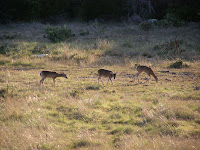BEING someone or DOING something?
Just finished reading "Boyd: The fighter pilot who changed the art of War" by Robert Coram.
John Boyd was born in 1927 and lost his father early in life. His sister suffered from polio and his mother raised the family by herself. His mother instilled in him the lesson that one should never share private family matters with anyone outside of the family. Perhaps because of the combination of growing up without a father, an inward looking perspective on problems life throws at you, and a desire to prove himself to his home town, his life took a very determined and driven path.
Though he missed out on major combat, first WW-II and then later Korea, he became a superb fighter pilot. Known as "40 second Boyd" he had a standing offer to any pilot. Starting from an inferior, defensive position, he would turn the tables on his opponent, moving to a superior, offensive position, in 40 seconds or less or else he would pay his opponent some money. He never had to pay up. It was during this time, thinking about quantitative measures and comparisons of fighter maneuverability, that he started on his incredibly creative and valuable contribution to fighter aviation and combat in general.
He was undoubtedly a creative genius and determined to get his way, which was usually right. His contributions include
- Development of the E-M (Energy-Maneuverability) theory, that allowed the quantification and comparison of fighter airplane maneuverability and dynamics.
- Design of the F-15 (which he hated for being gold-plated) and later a lightweight fighter, that became the F-16.
- Research into theories of creativity -- Destruction and creation.
- Maneuver warfare -- Boyd developed his brief title "Patterns of Conflict" over time. Taking liberally from Sun Tzu's "The Art of War" and from various military engagements spanning Genghis Khan and Alexander the Great and the Wehrmacht's "Blitzkreig", Boyd realized that centralized warfare and decision making are inferior to distributed decision making. Commanders should lead from the front, disseminate the overarching schwerpunkt and command lightly by fingerspitzengefuhl but leave the tactical decision making to sub-commanders in the field.
- The OODA loop -- get inside the decision making loop of your opponent, get inside his mind, and you get to control your opponent's thinking and behavior.
- Weapons systems procurement reform and careerism.
Though lacking in tact and with an abundance of arrogance, aggressiveness and drive, he progressed to full Colonel in the Air Force before he "retired". Ironically, his arguably most valuable contributions to aviation and warfare, were made, from an office in the Pentagon, after he retired from the Air Force. Even though his Air Force pension was minuscule ($1300/month) he refused to be a paid consultant at the Pentagon. Pentagon rules however required that he be paid no less than once during any two week period, so he relented to accepting a pittance of a salary.
During this time, he took on the establishment as, arguably, the ringleader of the "reform movement". His experience with the B-1 bomber convinced him that the weapons development and procurement process was seriously broken. Weapons systems often were not what was needed, and budgeting was inaccurate and wishful, thus leaving US armed forces in a position of unpreparedness. For example, when development started on the B-1, the projected costs were around $20M per copy. By the time Reagan approved the bomber and production started, the costs where $260M per copy.
Later, Boyd developed his brief on maneuver warfare and tried to get the Air Force to adopt some of the techniques but was blocked time and again by doctrinaire generals. Only the Marine Corp adopted some of his ideas to great success.
John Boyd had six close friends, his acolytes. They all suffered through "the pain", Boyd's daily phone calls, usually late at night or early morning, which lasted for hours at a time. Boyd would debate or discuss his latest breakthroughs or read whole passages from books he was reading on topics he was researching. All proteges were asked the "Do you want to BE someone or do you want to DO something" question. Boyd considered careerism to be anathema and was completely unconcerned about rank or title or compensation. He clearly wanted to contribute to his country, to make a difference; to DO something.
But a protege who was asked this question never responded with "At what cost?"
After reading this book, I'm left with a profound sadness concerning the life of the people AROUND John Boyd. He fathered five children, but neglected them profoundly. His first son suffered from polio and rather than move to Florida, as his wife had frequently requested so that Stephen could enjoy his one pleasure, the beach, Boyd insisted that his family live in a tiny basement apartment in a low-class neighborhood near the Pentagon. He didn't seem to spend a lot of time with his family, so absorbed was he in his work.
One could argue that Boyd didn't have the financial resources to take better care of his family. But, so determined was he to DO something that he never cared whether his work was attributed to him. He thus never really benefited from his work. Though he constantly railed against careerism at the Pentagon, one has to wonder whether the families of the so-called "perfumed princes" (as he referred to high ranking officers primarily interested in climbing the ladder) suffered as much as Boyd's family did as a result of their choices.
Having a family is a choice and once made assumes that one dedicates time and energy to the betterment of said family members. Neglecting ones duty of the betterment of ones family raises the question of the original choice. Observing how Boyd "hosed" his various opponents at the Pentagon leads one to the conclusion that he meticulously planned every move of his strategy, every choice. So one is left to conclude that Boyd chose to neglect his family.
I read a review of the above mentioned book on Amazon. The reviewer "publius_1788" wrote:
I'm not sure I would want to work for him or with him, and I certainly would not want to be one of his children, but America needs more like him.Without a doubt, Boyd's contributions to reforming military decision making and war making are essential to America's strength. His personal sacrifice in these endeavors is honorable and beyond compare. Requiring the unchosen sacrifice of others is, however, contemptible.















